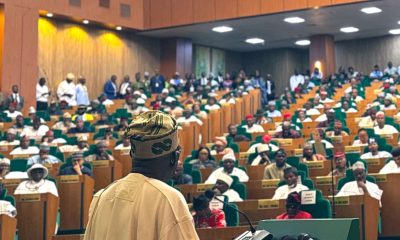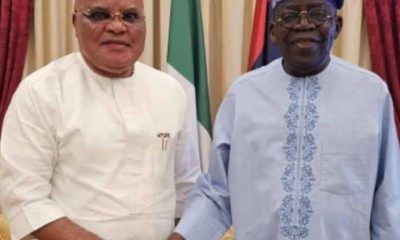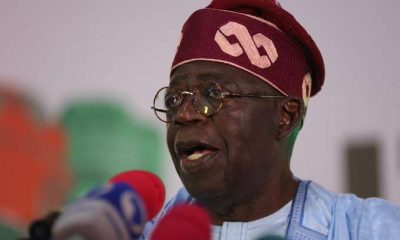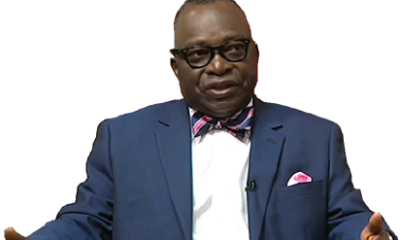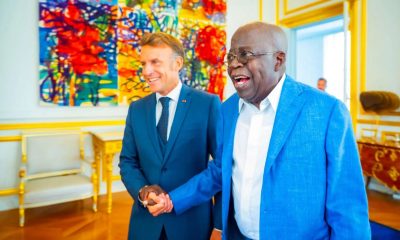Business
2027: Improving economy gives Tinubu’s re-election bid a boost
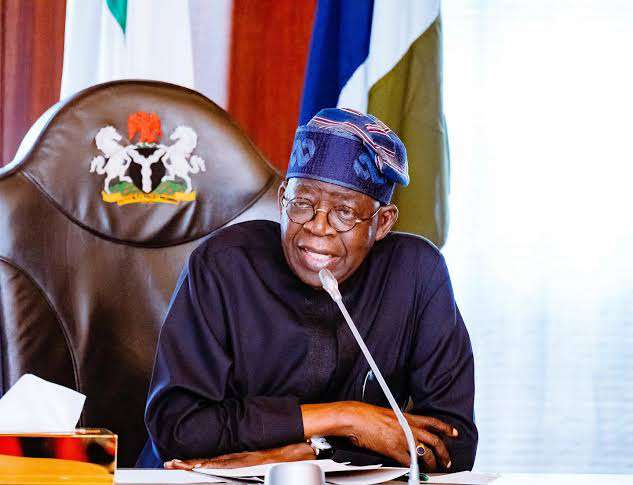
…as opposition seeks new planks to discredit ruling party
The re-election bid of incumbent President Bola Tinubu and his political party, the All Progressives Congress (APC), in the 2027 general elections seems to be receiving a major boost with the slow but steady recovery of Nigeria’s ailing economy, Business Hallmark can report.
From a near shutdown and collapse in 2023 and 2024 as a result of the shocks created by the several belt-tightening policies introduced by the new administration, the economy is now on the path of growth according to several measuring indices and rating agencies.
While the current administration is basking in the euphoria of having the economy back on the path of growth, opposition parties and their leaders, who had used the negative effects of the administration’s harsh economic policies on hapless citizens and businesses to constantly criticize the government are said to jittery that the current economic crisis would not last for it to be used as a campaign weapon in the 2027 general elections.
As a result, opposition leaders, it was learnt at the weekend, have started looking at different ways of painting the government in red in order to win votes in the coming elections.
It would be recalled that the health situation of Nigeria’s economy, which struggled in the last eight years of the Peoples Democratic Party (PDP) in power (2007 to 2015), plunged into recession during the last two administrations of the ruling APC.
Mismanagement Plus Devaluation
While the administration of former President Muhammadu Buhari totally mismanaged the economy during his time in office from 2015 to 2023, almost sending the economy into coma, the attempt by the incumbent President Bola Tinubu to reverse the drift immediately sent the economy into a tailspin, causing anguish for many homes and businesses.
For instance, as a result of the scraping of the controversial fuel subsidy regime, prices of petrol and diesel used by many homes and businesses to fuel vehicles and power generators, rose from about N180 and N845 per liter in May 2023 to N1,300 and N1,800 respectively in October 2024.
In the same vein, naira exchange rate to dollar, which stood at N440 in June 2023, climbed to a peak of N1,880 in 2024 as a result of the unification of the multiple foreign exchange windows operated by the Central Bank of Nigeria (CBN) by the Federal
Government.
Consequently, prices of basic goods, commodities, manufactured goods and services hit the roof, with inflation rate rising from 22.22% in June 2023 to 34.80% by December 2024.
The high cost of food items was more debilitating on millions Nigerians with many unable to feed well.
For instance, the price of 50kg bag of rice rose to between N95,000 to N125,000 depending on the brand and quality; a 25-liter container of vegetable oil sold for between N86,000 and N95,000, while a 5-liter keg of vegetable oil sold for N18,000 about a year ago.
Also, a 4-liter paint measurement of garri sold for between N3,000 and N5,000 in 2024, depending on the brand and quality; a 500g spaghetti and macaroni sold for between N1,050 and N1,200; a cartoon of 70 grams of noodles (40 pieces) was priced between N9,800 and N10,500; a Derica measure of beans was priced at N1,800 and N2,000, a kilogram of frozen chicken and Titus fish both sold for as high as N7,000, while a crate of eggs (30 pieces) was sold for N6,800.
Apart from high inflation rates, the nation’s Gross Domestic Products (GDP) remained stagnant at below three percent for many years with two recessions as crude oil production crash to a record low of 900,000 barrels per day, resulting in governments at all levels unable to fund projects, forcing them to recourse to loans.
Daily bombarded by cries and shouts of hardship in the land, the Federal Government had gone on the offensive. While admonishing Nigerians to exercise patience for the reforms it introduced to take shape, it assured them that things will soon change for good, which has not been seen in two years.
But the opposition refused to accept the assurances. Capitalising on the negative trends in the economy, the opposition, especially the Labour Party (LP) and the Peoples Democratic Party (PDP) constantly hit out at the government, condemning the ways it has handled the economy, while reminding Nigerians electorates that the APC government does not deserve their votes come 2027.
Positive Economic Indicators
However, the nation’s economy from objective indicators has begun to turn the corner, allowing the government to have a little breathing space from barrage of attacks coming from opposition politicians and economic experts.
Food Inflation
One of the positives for government is the softening of inflation that has ravaged the nation for several years.
Nigeria’s headline inflation moderated to 20.12 percent year-on-year in August, down from 21.88 percent recorded in July.
According to the National Bureau of Statistics (NBS), inflation easing in August was driven by softer energy prices and ongoing stability in the FX market.
On a month-on-month basis, headline inflation dropped by 0.74 percent in August, compared with 1.99 percent the previous month.
Specifically, food inflation moderated, easing to 21.87 percent in August 2025, representing a 15.65 percent lower compared to the 37.52 percent recorded in August 2024 and 22.74 percent reported in July 2025.
“On a month-on-month basis, food inflation rate in August 2025 was 1.65 percent, down by 1.47 percent compared to July 2025 (3.12 percent).
“The decrease can be attributed to the rate of decline in the average prices of rice (imported), rice (local), guinea corn flour, maize flour sold loose, guinea corn (sorghum), millet, semolina, soya milk etc,” the bureau stated in the CPI report. At the height of the inflation, government had allowed import of some food items to increase supply and cushion prices.
In another plus for the government, the naira recorded its strongest gain in eight months on Friday, September 19, 2025, when it gained N11.08 against the dollar at the official window.
According to the CBN’s foreign exchange data released on Friday, September 19, the naira closed at N1,487.89/$1, against the N1,498.97/$1 it traded on Thursday, September 18.
The naira also gained N5 against the dollar in the parallel market to trade at N1,525/$1, as against the previous day’s rate of N1,530/$1.
Speaking on the continued appreciation of the naira, currency traders and experts projected that the nation’s currency will hit about N1,400 per dollar before the end of the year.
In the same vein, Nigeria’s foreign reserves climbed to $41.844 billion on Thursday, September 18, 2025, from $41.698 billion on Friday, September 12.
Gross Domestic Product
As a result of the stability in the foreign exchange market and rising reserves, FX induced inflation has cooled, with Nigerians having more value on money in their pockets.
Nigeria’s Gross Domestic Product (GDP) report also grew by 3.13 per cent in the first quarter of 2025 from the 2.27 per cent recorded in the same period in 2024.
In nominal terms, the economy grew to N372.82 trillion from N205.09 trillion in the base year of 2019.
Driving the GDP growth is the agriculture, real estate and oil and gas sectors.
Crude Output and Fuel Export
According to the Nigerian Upstream Petroleum Regulatory Commission (NUPRC), Nigeria’s average daily crude oil production in the first six months of 2025 stand at 1.8 million barrels. Like the upstream petroleum sector, the downstream petroleum sector is also witnessing giant strides with Nigeria now a net exporter of refined petroleum products, courtesy of the 650,000 barrels per day capacity Dangote Refinery located in Ibeju-Lekki, Lagos.
On Saturday, September 14, 2025, the management of Dangote Refinery announced that the facility, which has consistently supplied the domestic market, exported 1.1 billion liters of petrol in three months.
This figure is aside other refined petroleum products like diesel, Liquefied Petroleum Gas (LPG) and aviation fuel produced and exported by the refinery.
Boost For Government
With a liter of petrol currently selling for $1.31 in the International market, this means that Nigeria, through Dangote Refinery, earned a revenue of $1.441 billion from the 1.1billion liters of petrol it sold in the International market in the last three months, which translates to N2.162 trillion at the current exchange rate
The coming on board of Dangote Refinery has created new streams of foreign exchange for the country through the export of refined petroleum products. All these positives, experts say, will reflect positively on the nation’s economy.
According to a financial expert, Dr. Peju Beckley, the turnaround in Nigeria’s economy will save the blushes of the current administration, especially from the knocks and backlash its fiscal and monetary reforms of 2023 created.
“As voters prepare to go to the polls in 2027 to choose the next government, the economy will be among the top campaign topics.
“Public discontent over living standards have been running high, fueled largely by opposition politicians, who are on the same page with the Tinubu administration on the reforms so far implemented, but are playing ostrich because of political considerations.
“While household budgets have been strained and people are still paying much more for essentials, including food, inflation is finally cooling.
“The good news for Nigerians is that not only has inflation slowed down, there are also signs that prices are easing even faster than official inflation figures suggest.
“I see the economy deciding the outcome of elections at the federal level at the end of the day as voters, especially those from the northern part of the country, will either line behind the present government like they did in 2023 if things improve, or throw it out of office if the economy unravels by going south.
“Whoever wins the 2027 presidential election will benefit from how successful, or otherwise, the nation’s current economic managers are able to ease the cost of living for millions of households.
“However, I don’t see that happening (economy going south) as all indices are pointing to a sustained rally. Unless a major shock like the Covid19 outbreak of 2020 and lockdown happens, the narratives will favor the sitting government,” Beckley projected.
However, the leader of the Social Democratic Party (SDP) and the party’s presidential candidate in the 2023 election, Mr. Adewole Adebayo, described the much celebrated economic stability under President Tinubu-led APC as a ruse.
According to Adebayo, government’s celebration of the report that inflation has dropped to 20.7 percent is a slap on Nigerians because inflation rates does not exceed five percent across all African countries
While agreeing that the situation is slightly better than what it was this time last year, Adebayo argued that Nigeria still has a long way to go.
“In a way, the economy, in terms of these numbers, is not worse now than it was last year. It’s slightly better but far, far away from where it ought to be.
“One thing that has worked for the government is the relative fall in food inflation. Food inflation has dropped, and food inflation is a major component of the inflation basket.
“While the prices of foodstuffs have come down a lot, it hasn’t dropped to the level where many Nigerians can feel it. It’s like you trying to catch a bag of rice that is placed 10 feet above you. Your hand cannot reach it. But if the height is dropped to eight feet, your hand still cannot reach it, but it’s lower than before. That’s how it is,” the SDP chieftain stated.


